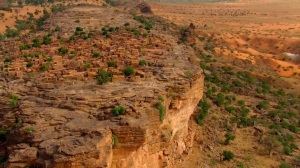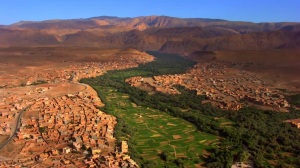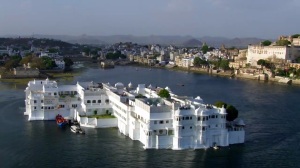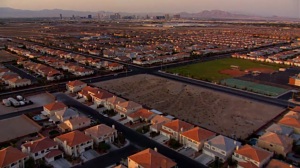I often wonder if it would be possible to do any kind of serious study into urban morphology without the help of Google Earth. I know it has been indispensable to my studies, perhaps as indispensable as the microscope is to biologists. Google Earth is our macroscope, it allows us to see what is too large to see with the naked eye. But no matter how useful satellite photography is, you cannot truly see depth without aerial photography, and the master of aerial photography is without a doubt French photographer Yann Arthus-Bertrand, famous for enormous coffee-table books filled with photography so rich as to be overwhelming.
Arthus-Bertrand has made the jump to high-definition cinematography and directed a "documentary" (there is really no accurate way to describe this film) called Home, which was released free of charge on the Internet a few weeks ago. You can watch it on YouTube or download it from your favorite BitTorrent source. The film is awe-inspiring. Here are some still images I extracted.
The film is a tour of Earth's ecologies, starting from elementary life to cities. The most striking images are those of natural cities, particularly one which seems to grow out of the rock as if it were only a feature of it. And who can argue that it isn't? But that detail seems to escape the narrative.
Yann Arthus-Bertrand's talent is undeniable, at some point in the film he even makes Manhattan seem small. But the film quickly turns into a vessel of green propaganda (sponsored by the Gucci fashion house) while it could have been a celebration of mankind's ties to nature. At the climax of its alarmism, the foundation of the green mindset is spelled out with as much emphasis as the narrator can apply. Denouncing the thaw of Siberian permafrost, the narrator recites "if the permafrost melts, the methane released would cause the greenhouse effect to race out of control with consequences no one can predict." At no point in the film does the alarm in her voice sound so grave. It is not so much climate change that is feared, but the unknown, any change at all.
The obsession with control and prediction is tragically what has caused the most destruction and chaos in our human ecologies. It is control that dictates that homes may not be owned in the world's sprawling slums, in the name of upholding a failed prediction, city planning. Because slum homes can be summarily demolished the slums remain in squalid poverty, vulnerable to any environmental change, man-made or not. The only true sustainability in a chaotic world is the ability to renew our environments for any change we meet, and control and prediction are an obstacle to this.
Green politics fails not because it relies on facts that are incorrect, but because it relies on facts that are inherently unknowable. We can sound the alarm about the total global population, the fact is we have absolutely no idea what the total global population is. We can at best obtain an estimate, but that estimate is useless for any kind of action. Action in a complex system is local and does not rely on global knowledge, but only on reacting to local conditions. The environment always tells you what to be doing in the moment.
In its obsession with control, the film ends up making recommendations for creating the same kind of technocratic utopia that was promised to us by the modernists. It praises one of the world's poorest countries for having one of the most intensive state schooling program, evading a causal link between poverty and control of children's minds. The ultimate solution to climate change proposed is to cover the world's open land with solar panels, and the seas with wind farms, an act that would be as destructive to the environment as all the other monocultures denounced in the film. (And no one dares ask where those solar panels came from.)
Never is a serious look taken at the process of the natural cities, which to someone trapped in the paradigm of control and prediction would make absolutely no sense, but which Christopher Alexander masterfully demystifies in The Nature of Order. Only through such a revolution can we avoid repeating the chaos of modernism with a green twist.
People trapped in the mindset of prediction cannot think beyond simple physical processes (type I and II of Wolfram's classification). These processes are always highly unstable and prone to die with any disruption. But life is not a simple process. It is a process that is always expanding, growing exponentially to fill any space it can fit into. Biologists quarantined a volcanic island that appeared into existence in the 1960's near Iceland. They wanted to see how life colonized it. This process has taken place at astonishing speed, and today the island teems with life and has a rich cover of top soil, bewildering the biologists. The real threat to the island is not ecological disequilibrium, but the inevitable erosion back into the ocean.
Life is the most powerful force in the universe. It will take anything the Earth does to it. But unless we adopt life as our own social paradigm, we will not fare well. If we base our society on control instead of growth, the first unpredictable shock we witness will cause our collapse. So watch Home, be inspired by it, but do yourself a favor and turn the sound off.




Comments
I love the amazing scenery of Home, it's stunning! The organic agricultural villages of Africa are fantastic, i fully endorse their simple forms. The faux-American suburbs of Shanghai were shocking!
Keep up the excellent work!
Beautiful film, but it's preachy without being original. Even when I agreed with the conclusion being stated, I was annoyed that the narration gave no insight into why they think some things were good and some things were bad. For instance, terracing for rice is good (I think that's what the musical soundtrack implied) while doing the same thing for oil palms the next island over is awful monoculture and a destructive alteration of the landscape. Now I personally realize there is a difference, but the movie makes no attempt to justify it besides implying that peasants are good and capitalists are bad. For the first, they shape the land with patience and devotion; for the second, terracing is breaking the bonds of living matter, described as a catastrophe.
That lovely white island villa pictured above is objectively the complete destruction of the natural environment it occupies, yet it is not denounced by the orchestra. I wonder where it is.
The white island is on the Ganges in India. I presume that it is not denounced because the director feels that it is a part of nature, while other human artifacts are not. Therefore it is incorrect to claim that it is a destruction of nature; it is a transformation of nature from one aspect to another, much like all living organisms perform.
The mystery between nature creation and destruction is not difficult to elucidate, but it runs counter to established scientific ideas. Human artifacts are a part of a nature when they are produced with the same class of processes with which natural things are made, complex fractal processes.
Christopher Alexander wrote an article called Harmony Seeking Computations and specifically mentioned the way environmentalists placing wind turbines were destroying nature. The flip-side to that fact is that humans creating, for example, shantytowns are creating nature of a new aspect, and would create a much better natural environment if the war on spontaneous urbanization waged by authorities were to end.
Forget the movie for a second - are you saying that action should not be taken on global warming because we cannot be certain of the consequences? This despite the fact that there is a scientific consensus that action should be taken? I'm not sure if this fits into the paradigm of imposed control vs. organic complexity. I think it just represents the best option for self preservation. There are few negative consequences of reducing greenhouse gas emissions, in relation to the 100% certain negative consequences of not acting (air pollution, environmental damage from oil extraction etc.) and even the less certain but much more grave consequences of global warming.
It should be a prerequisite of any action that you know what the result of this action is going to be, otherwise you may be creating a whole new disaster, by consensus or not.
We don't know what the consequences of global warming are going to be, and we don't know if anything we do will have any impact on the climate, or if it won't make things worse. The climate is not a linear system and it can't be tackled with linear science. And the means used to attempt to control global warming, concentrations of power in a few world-spanning bodies, have been a cause of social catastrophes that are repeating themselves.
We are currently living through a social disaster of historic proportions, and that disaster is most definitely man-made. Yet there is no consensus on resolving it because it arises out of a moral error, and someone always benefits from a moral error. The same is at work with the global warming lobby.
just watched it ...
it was awesome ...
even blogged about it ...
very good indeed ...
my take is here ... http://is.gd/1W7XT ...
I think we need to throe all the books, from all over the world, into deep sea. Bulldoze every institution that claims to give education. Overall, after 20 years of education, what are we getting from them....
who is more dangerous today... the person who has become a scientist/engineer/business manager aftergetting education... or the person who is still uneducated by chance....
Who is causing more pollution? Destroying forests? Making killer weapons?... is it educated or uneducated.....
Then? If our education institutes keep producing such devils, could the earth be saved....
The only way out is..either change the entire education system throughout the world.... or forget it...
I think your argument about control is irrelevant the point about the film is its meant to be a vaguely populist called to action and its meant to inspire optimism about our situation and 'what remains'. Who cares if the same though process is behind this move to act the point is that this action caused this situation and by the same token we can reverse it. If you want to watch a similar film without the moraliswing then go watch Koyanisqaatsi and shut the hell up you doosh bag.
sorry bad netiquette but felt angry in the moment mwah lets kiss and make up after all we have only ten years left!
Funny argument really! And calling this propaganda is surprising too. All day long you are surrounded by commercials on the streets, on radio, on tv, on the internet and even hidden in movies that try to brainwash you to consume more. And that seems ok with you? Then you see ONE movie citing scientific realities and you say it is propaganda? My intuition is that you have been brainwashed long ago and refuse to face reality by admitting that your lifestyle isn't sustainable.
You refer to social disasters caused by fighting global warming? Well I'd love some examples of those! I don't have to give you social disasters of problems caused by over exploiting nature as the movies is packed with examples. If you want others, look up the Aral sea disaster, Haiti, all the major rivers running dry,...
And I don't understand why you focus only on global warming since this is only one problem the movie pinpoints. What about deforestation, water pollution, air pollution, excessive water exploitation,... Should we just continue doing that too?
Lastly you say: "Green politics fails not because it relies on facts that are incorrect, but because it relies on facts that are inherently unknowable". So what do you know about the situation if we would just continue business as usual? Do you know better than all scientists brought together?
Man. The Earth is dying or rather the systems that sustain life and all you care about is pretty pictures!
What do you mean turn the sound off! Are you crazy! They have a totally valid message to deliver. Uncontrolled growth is what got us in this mess in the first place. Yes I do believe in their argument. We need sustainable systems. So according to you we should ignore what is happening because you did not provide any alternative solutions, and just grow ourselves into oblivion. That is what the Chinese are doing. God help us if China becomes the new America.
Excellent criticism!!! I watched the film with some friends, all of us industrial ecologists, and we all had the same reaction as you "watch Home, be inspired by it, but do yourself a favor and turn the sound off". You nail it in the best way in your article.
I propose this clip from George Carlin. I think it is the best way to put it, in the most non-scientific, simple, and straight-forward way.
http://www.youtube.com/watch?v=eScDfYzMEEw
Dear François,
You are very passionate about these issues, but you are not taking in the whole picture. What is the the global warming pact if not the creation of a global USSR? What is the cause of Haiti's deforestation, if not a political disaster starting with the American invasion and occupation in the early 20th century?
In fact, I do know better than all scientists brought together, in some things. That is the fundamental problem of tacit knowledge in complexity science - you can't know everything everywhere. Only by connecting people through systems of individual action do you bring their total knowledge into one system. Appealing to authority is what creates disasters.
the reviewers quibble about global population (is it 6.6bn or 6.7bn) does it matter when it's probably too many for sustainability by a factor of 10. And of course reviewer - we would need to cover the entire planet with solar panels and the seas with wind turbines. Im sure the reviewer would prefer little solar lights lighting up their garden than solar power panels doing something useful - ie. reducing oil, coal, nuclear demand. And let me get this straight... the reviewer argues that releasing methane (a greenhouse gas 24x worse than CO2) we should 'let happen' because we don't know if it's consequences would be good / or would be bad? So basically we can't trust scientists that say it's a tipping point and would send global temperatures up by degrees instead of fractions of a degree?